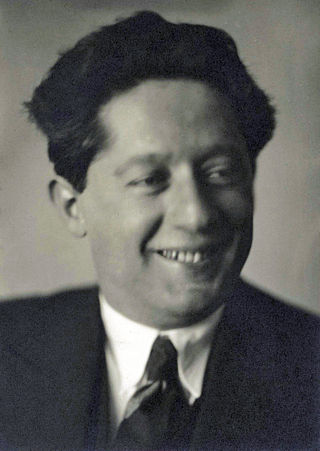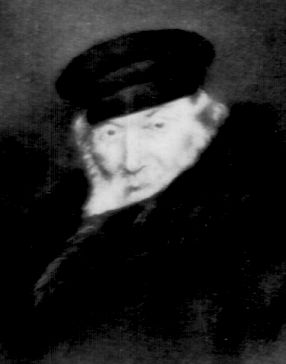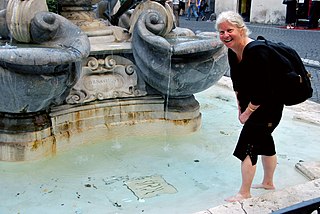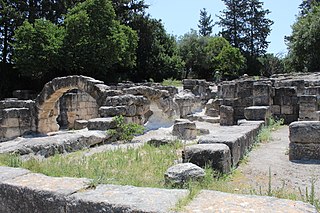Career
From 1991 to 1993, Lapin was adjunct assistant professor of history at the State University of New York at Purchase. In 1993–1994, he was assistant professor of Rabbinics and Ancient Jewish History at Baltimore Hebrew University. In 1994, he joined the University of Maryland, where he served as assistant professor in the Department of History from 1994 to 1998, associate professor from 1998 to 2005, and since 2005 as professor. In 2010, he was appointed Robert H. Smith Professor of Jewish Studies. [2]
As a professor of Jewish studies at Maryland, Lapin studies the history and literature of the Jews in late antiquity. He thus investigates where the Rabbis came from, the origins of the synagogue and the prayers, and how Jews coped with Roman rule. [3]
Lapin served as the director of the Joseph and Rebecca Meyerhoff Program and Center for Jewish Studies at the University of Maryland from 2006 to 2011. [1] And he became the director of the Jewish Studies Program again in May 2017. [3]
As director of the center, Lapin invited Michael Twitty, a food blogger and Judaic studies teacher from Washington, D.C., to speak to University of Maryland students about the intersection of Judaism and African-American culture. [4] Lapin said that Twitty is "someone who crosses all sorts of boundaries and encourages us to talk about all sorts of issues that are important on campus and the wider community." [4] And in December 2019, he invited a Sephardic law and ethics professor from Bar-Ilan University to the University of Maryland to discuss his discovery and translation of an 18th-century story about a Rabbi and a Sheikh. [5]
In May 2019, Lapin reported that the Jewish studies major at the university was being redesigned, saying: “We’re going to take a real serious look at the fact that we don’t have a lot of majors and what can we do to encourage majors.” [6] Lapin attributed the recent decrease in students in the program to campus recruiters’ “emphasis” on bringing in STEM majors as well as “the interest in career-oriented majors on the part of students.” [6] Lapin suggested that another big change in the program will be in having students develop an area of interest and concentrate on that area of interest. [6] He related that the department was also questioning how much Hebrew the curriculum should have, saying: “We require more Hebrew than most other majors, which makes it more like a language major in some respects.” [6] Lapin also reported that the program was working on creating other majors as well, saying: “We have a new major in Ancient Middle Eastern Studies,” which was in the process of being reviewed by the university. [6]
At a Digital Humanities session at a joint conference of the Society of Biblical Literature and American Academy of Religion in San Diego in November 2019, Lapin presented with Professor Daniel Stökl Ben Ezra of the École pratique des hautes études on “Automatic Transcriptions of Medieval Hebrew Manuscripts and Crowdsourcing Their Corrections.” They discussed digital rendering of Hebrew texts, which involve data points at the level of the letter or stroke. They told how they were originally at 3 errors per 100 characters, and are now at 1.8. They reported that computers can learn to recognize letters extended to fill a line of text. [7]
In January 2020, after a two-year review process by Lapin and Maxine Grossman, another Jewish Studies professor who joined him in its development, the Maryland Higher Education Commission approved a new major focused on religions of the ancient Middle East. The 30-credit program will study the emergence of ancient Judaism, Christianity, and early Islam between 850 CE and 1200 CE. [8]
With professors Shaye J. D. Cohen and Robert Goldenberg, Lapin edited The Oxford Annotated Mishnah. [9]
Halakha, also transliterated as halacha, halakhah, and halocho, is the collective body of Jewish religious laws that are derived from the Written and Oral Torah. Halakha is based on biblical commandments (mitzvot), subsequent Talmudic and rabbinic laws, and the customs and traditions which were compiled in the many books such as the Shulchan Aruch. Halakha is often translated as "Jewish law", although a more literal translation might be "the way to behave" or "the way of walking". The word is derived from the root which means "to behave". Halakha not only guides religious practices and beliefs; it also guides numerous aspects of day-to-day life.

The Mishnah or the Mishna is the first written collection of the Jewish oral traditions that are known as the Oral Torah. It is also the first work of rabbinic literature, with the oldest surviving material dating to the 6th to 7th centuries BCE.

The Talmud is, after the Hebrew Bible, the central text of Rabbinic Judaism and the primary source of Jewish religious law (halakha) and Jewish theology. Until the advent of modernity, in nearly all Jewish communities, the Talmud was the centerpiece of Jewish cultural life and was foundational to "all Jewish thought and aspirations", serving also as "the guide for the daily life" of Jews.
A rabbi is a spiritual leader or religious teacher in Judaism. One becomes a rabbi by being ordained by another rabbi—known as semikha—following a course of study of Jewish history and texts such as the Talmud. The basic form of the rabbi developed in the Pharisaic and Talmudic eras, when learned teachers assembled to codify Judaism's written and oral laws. The title "rabbi" was first used in the first century CE. In more recent centuries, the duties of a rabbi became increasingly influenced by the duties of the Protestant Christian minister, hence the title "pulpit rabbis", and in 19th-century Germany and the United States rabbinic activities including sermons, pastoral counseling, and representing the community to the outside, all increased in importance.
The Pharisees were a Jewish social movement and a school of thought in the Levant during the time of Second Temple Judaism. Following the destruction of the Second Temple in 70 AD, Pharisaic beliefs became the foundational, liturgical, and ritualistic basis for Rabbinic Judaism. Although the group does not exist anymore, their traditions are considered important among all various Jewish religious movements.

Louis Finkelstein was a Talmud scholar, an expert in Jewish law, and a leader of the Jewish Theological Seminary of America (JTS) and Conservative Judaism.

The Sanhedrin was a legislative and judicial assembly of either 23 or 70 elders, existing at both a local and central level in the ancient Land of Israel.

Saul Lieberman, also known as Rabbi Shaul Lieberman or, among some of his students, the Gra"sh, was a rabbi and a Talmudic scholar. He served as Professor of Talmud at the Jewish Theological Seminary of America (JTSA) for over 40 years, and for many years was dean of the Harry Fischel Institute in Israel and also president of the American Academy for Jewish Research.
Tannaim were the rabbinic sages whose views are recorded in the Mishnah, from approximately 10–220 CE. The period of the Tannaim, also referred to as the Mishnaic period, lasted about 210 years. It came after the period of the Zugot "Pairs" and was immediately followed by the period of the Amoraim "Interpreters".

Yisrael Meir ha-Kohen Kagan was an influential Lithuanian Jewish rabbi, Halakhist, posek, and ethicist whose works continue to be widely influential in Orthodox Jewish life. He was known popularly as the Chofetz Chaim, after his book on lashon hara, who was also well known for the Mishna Berurah, his book on ritual law.

The Jerusalem Talmud or Palestinian Talmud, also known as the Talmud of the Land of Israel, is a collection of rabbinic notes on the second-century Jewish oral tradition known as the Mishnah. Naming this version of the Talmud after Palestine or the Land of Israel—rather than Jerusalem—is considered more accurate, as the text originated mainly from Galilee in Byzantine Palaestina Secunda rather than from Jerusalem, where no Jews lived at the time.
According to Rabbinic Judaism, the Oral Torah or Oral Law are statutes and legal interpretations that were not recorded in the Five Books of Moses, the Written Torah, and which are regarded by Orthodox Jews as prescriptive and given at the same time. This holistic Jewish code of conduct encompasses a wide swathe of rituals, worship practices, God–man and interpersonal relationships, from dietary laws to Sabbath and festival observance to marital relations, agricultural practices, and civil claims and damages.

Rabbinic Judaism, also called Rabbinism, Rabbinicism, or Rabbanite Judaism, has been an orthodox form of Judaism since the 6th century CE, after the codification of the Babylonian Talmud. Rabbinic Judaism has its roots in the Pharisaic school of Second Temple Judaism and is based on the belief that Moses at Mount Sinai received both the Written Torah and the Oral Torah from God. The Oral Torah, transmitted orally, explains the Written Torah. At first, it was forbidden to write down the Oral Torah, but after the destruction of the Second Temple, it was decided to write it down in the form of the Talmud and other rabbinic texts for the sake of preservation.

Generically, a Galilean is a term that was used in classical sources to describe the inhabitants of Galilee, an area of northern Israel and southern Lebanon that extends from the northern coastal plain in the west to the Sea of Galilee and the Jordan Rift Valley to the east.
This is a list of books by Jacob Neusner. Articles, reviews, etc. are not included here.

The history of the Jews in the Roman Empire traces the interaction of Jews and Romans during the period of the Roman Empire. A Jewish diaspora had migrated to Rome and to the territories of Roman Europe from the land of Israel, Anatolia, Babylon and Alexandria in response to economic hardship and incessant warfare over the land of Israel between the Ptolemaic and Seleucid empires from the 4th to the 1st centuries BCE. In Rome, Jewish communities thrived economically. Jews became a significant part of the Roman Empire's population in the first century CE, with some estimates as high as 7 million people; however, this estimation has been questioned.
Musar literature is didactic Jewish ethical literature which describes virtues and vices and the path towards character improvement. This literature gives the name to the Musar movement, in 19th century Lithuania, but this article considers such literature more broadly.
The following outline is provided as an overview of and topical guide to Judaism:

Tal Ilan is an Israeli-born historian, notably of women's history in Judaism, and lexicographer. She is known for her work in rabbinic literature, the history of ancient Judaism, the Dead Sea Scrolls, ancient Jewish historiography, Jewish epigraphy, archaeology and papyrology, onomastics, and ancient Jewish magic. She is the initiator and director of The Feminist Commentary on the Babylonian Talmud (FCBT). She received her education from the Hebrew University of Jerusalem. She is currently professor of Jewish Studies at the Free University of Berlin.

The Rabbinic period, or the Talmudic period, denotes a transformative era in Jewish history, spanning from the destruction of the Second Temple in 70 CE to the Muslim conquest in 638 CE. Pivotal in shaping Judaism into its classical form, it is regarded as the second most important era in Jewish history after the Biblical period.









